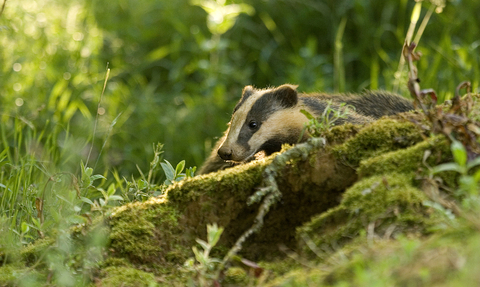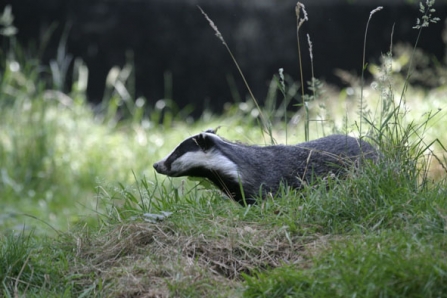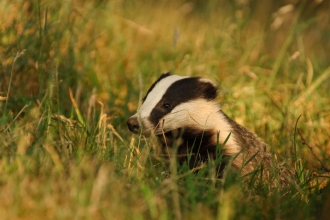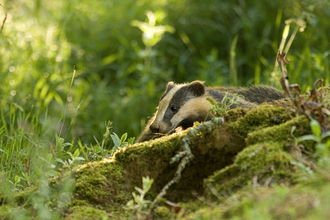
We oppose the badger cull
Devon Wildlife Trust opposes the government’s badger culling programme
We have opposed the badger cull since it first started and do not allow badger culling on our land

Badger. Photo, Darin Smith
What is bovine tuberculosis?
Bovine tuberculosis (bTB) is a highly infectious disease of cattle which devastates thousands of farming businesses annually. Since the mid-1980s, the incidence of bovine tuberculosis in cattle has increased substantially creating an economic burden on the taxpayer and the farming industry, as infected cattle must be culled. UK Government research shows that tuberculosis is not a major cause of death in badgers. Generally, infected badgers do not show any sign of infection and can survive for many years before suffering from severe emaciation.
Devon Wildlife Trust is very conscious of the hardship that bovine TB (bTB) causes in the farming community and the need to find the right mechanisms to control the disease.
However, we believe that a badger cull is not the answer. The scientific evidence demonstrates that culling is likely to be ineffective in fighting the disease and, worse still, risks making the problem even worse. We believe the emphasis of all our efforts should be to find a long-term solution and we are calling for the Government to turn its full attention to a widespread vaccination programme and halt all culling activity.
Devon Wildlife Trust continues to oppose the ineffective, unscientific and costly badger cull.
DWT is calling for the government to instead invest in the development of cattle vaccine, more effective TB tests and an oral badger vaccine. Measures to improve farm biosecurity will also be a vital part of effectively controlling bTB.
This is a cattle problem, not a badger problem
Evidence shows that badgers are not the primary cause of the spread of tuberculosis in cattle and that the primary route of infection is from cow-to-cow contact – so a vaccine for cattle should be a government priority.
The cull is scientifically unsound
Robust evidence is still lacking to demonstrate that badger culling is worth the loss of thousands of badgers and millions of pounds of public spending. To justify the badger cull and to try and show that badger culling is having a significant impact on lowering bovine TB in cattle, the previous UK Government regularly used the Downs et al (2019) paper and more recently, the Birch et al (2024) paper. Both papers however noted that they didn't or couldn't take acccount of confounding factors. The latter paper described one of these confounding factors, noting that the study farms involved in the Badger Control Policy were required to implement reasonable biosecurity measures. It went on to conclude that whilst it found a reduction in bovine TB on the study farms, the "vaccination of badgers, fertility control and on farm biosecurity may also achieve this effect".
Badgers are a valued species in the UK, protected by law. 25% of the European population is found in the UK, so we have an international responsibility to conserve them.
What are The Wildlife Trusts doing?
The Wildlife Trusts have been working on the issue of bovine tuberculosis and its links to badgers for several years. During this time our activities have included:
- Undertaking badger vaccination programmes since 2011* on our nature reserves and in the wider countryside in partnership with vets, farmers, and landowners.
- Standing up for badgers in local and national media
- Loobying the previous UK Government to drop this failed badger cull policy, implement an all-encompassing badger vaccine strategy and encouraging the advancement of the cattle vaccine
- Collating, summarising and presenting the science on the spread of bovine tuberculosis
- Encouraging our members and supporters to write to their MPs to press for a different approach to eradicating bovine tuberculosis, without culling badgers.
- Working with Defra on a Badger Edge Vaccination Scheme
- Supporting and promoting e-petitions to stop the cull
Read more about what The Wildlife Trusts believe to be the solution to tackling bovine tuberculosis, as well as recent blogs and press releases on the issue below:

Government culls badgers in 11 new areas this autumn, including Devon
• 69 new places will see up to nearly 68,000 badgers killed
• New cull zone in Devon declared although exact location is not made…
The Wildlife Trusts respond to new badger cull licences
The Wildlife Trusts are disappointed and saddened that the Government has issued new licenses to cull badgers in seven areas of England…

Government approves badger culling to 2026 and ignores public consultation
Today the Government announced that it will continue to issue licenses to kill badgers over the next four years. This will put 130,000…
Support our work
The vital work we do for nature depends on the support of people who care about the future of Devon’s wildlife and wild places.
